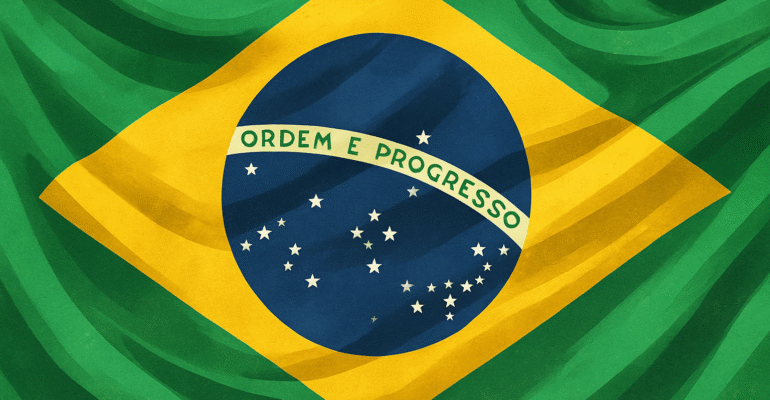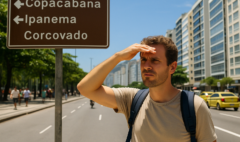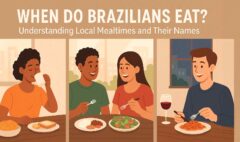What Is the Official Language of Brazil?
What Is the Official Language of Brazil?
Introduction: Brazil’s Linguistic Identity
When people think of South America, they often assume that Spanish dominates the whole continent. And that’s almost true—except for Brazil. Brazil stands out as a linguistic outlier. So, what’s the official language of Brazil? The answer is simple: Portuguese. But the story behind that is anything but simple.
Portuguese as the Official Language
Why Portuguese and Not Spanish?
It might surprise you to know that Brazil is the only Portuguese-speaking country in all of the Americas. The reason? A treaty. Back in 1494, Spain and Portugal signed the Treaty of Tordesillas, essentially drawing an invisible line down the map of the New World. The Portuguese claimed what would eventually become Brazil, while the Spanish took most of the rest.
Historical Roots of the Portuguese Language in Brazil
Portuguese settlers began arriving in the early 1500s. Over centuries of colonization, assimilation, and growth, the language took deep root in Brazilian soil. Indigenous languages began to fade from urban areas, and Portuguese became the dominant tongue by the 18th century.
Brazilian Portuguese vs. European Portuguese
Pronunciation Differences
Think of it like British English vs. American English. Same base, different vibe. Brazilian Portuguese tends to be more melodic and rhythmic. European Portuguese often sounds more mumbled or slurred to non-native ears.
Vocabulary Variations
Even everyday words can be different. For instance:
-
Bus = “ônibus” (Brazil) vs. “autocarro” (Portugal)
-
Cellphone = “celular” (Brazil) vs. “telemóvel” (Portugal)
Grammar and Syntax Divergence
There are also subtle shifts in grammar. Brazilians often use subject pronouns more frequently, while the Portuguese drop them when context makes them obvious. Formality levels and verb structures also vary.
Regional Accents and Dialects Within Brazil
North vs. South
Brazil is massive. So naturally, accents change from state to state. Northerners might drop final “s” sounds or nasalize more. In the South, there’s a heavier influence from European immigrants like Italians and Germans.
Urban vs. Rural Speech
City dwellers often speak faster and incorporate more slang, while rural communities may preserve older expressions and pronunciations. Think São Paulo hustle vs. countryside charm.
Indigenous Languages of Brazil
Number and Types of Native Languages
Before Portuguese arrived, Brazil was home to hundreds of Indigenous languages. Today, there are still 180+ Indigenous languages spoken across the country—especially in the Amazon region.
Governmental Efforts to Preserve Them
Some schools in Indigenous territories are bilingual. The Brazilian constitution even recognizes the rights of Indigenous communities to preserve and teach their native languages.
Immigrant Languages in Brazil
German, Italian, Japanese Communities
Over the years, waves of immigration brought new languages into the Brazilian mix. You’ll find German spoken in parts of Santa Catarina, Italian dialects in Rio Grande do Sul, and Japanese in São Paulo neighborhoods.
Language Use in Everyday Life and Cultural Festivals
These languages appear in festivals, cuisine, and even street signs. In some towns, children grow up trilingual—speaking Portuguese, their heritage language, and English or Spanish at school.
The Role of English and Spanish in Modern Brazil
Education and Tourism
While not official, English and Spanish are both taught in schools and widely used in tourist hotspots. Most Brazilians understand at least some basic English phrases—especially the younger generation.
International Business and Media
If you’re doing business in Brazil, expect meetings in Portuguese but contracts in English. International brands and TV often use English slogans, and Netflix is full of dubbed or subtitled content.
Language Policy and Education in Brazil
National Curriculum Standards
Portuguese is the main language of instruction in schools. It’s required by law and reinforced through literature, grammar, and writing lessons.
Bilingual Schools and Programs
In some regions, especially near Indigenous or immigrant communities, schools offer bilingual education. There are also many private schools that teach in English, Spanish, or French.
Portuguese in Brazilian Pop Culture
Music, TV, and Movies
Samba, funk, MPB, sertanejo—music is one of the biggest ways Portuguese lives and evolves in Brazil. Brazilian TV and films also reflect regional expressions and slang, creating a living linguistic lab.
Slang and Street Talk
From “beleza” to “cara” to “tipo assim”, slang colors conversation. And Brazilians love to play with language—shortening words, inventing phrases, or turning everything into a joke.
Common Misconceptions About Language in Brazil
Do Brazilians Speak Spanish?
Nope. While Spanish is somewhat understood due to proximity and education, it’s not widely spoken. Many Brazilians get annoyed at the assumption!
Is Brazilian Portuguese a Dialect?
Absolutely not. It’s a full-fledged, standardized national language, just like American English is to British English.
Learning Brazilian Portuguese as a Foreign Language
Tips for Beginners
-
Start with listening: Brazilian music, YouTube, Netflix with subtitles
-
Practice daily, even 10 minutes a day
-
Focus on pronunciation from the start
Best Resources for Study
-
Duolingo or Memrise for daily vocab
-
The Brazilian Ways for immersive learning
-
Language partners through apps like Tandem or HelloTalk
Final Thoughts on Brazil’s Linguistic Landscape
Brazil’s language story is rich, complex, and uniquely vibrant. Yes, Portuguese is the official language—but it’s more than that. It’s a melting pot of influences, a tool for cultural identity, and a gateway to connection with over 200 million people. Whether you’re planning a trip, doing business, or just curious about the world, learning a little Portuguese goes a long way in understanding Brazil.
Learn Portuguese the Brazilian Way! 🇧🇷✨
At The Brazilian Ways, we believe language learning should be fun, immersive, and deeply connected to culture. Our unique courses help you speak Portuguese naturally while experiencing Brazil through its music, films, literature, and dance.
🎶 The Brazilian Music Club – Learn Portuguese through the rhythm and lyrics of Brazilian music.
🎬 The Movie Club – Improve your Portuguese while exploring the best of Brazilian cinema. 📖 The Short Story Club – Enhance your skills by diving into Brazilian literature. 💃 Portuguese for Zouk – Connect with the Zouk dance community while learning Portuguese.
✨ Join a vibrant community of learners and experience Brazil through language! 👉 Explore our programs and start today! 🚀
📲 Follow us on Instagram for more engaging content, language tips, and cultural insights: @thebrazilianways
FAQs
1. Do all Brazilians speak Portuguese fluently?
Yes, the vast majority of Brazilians are native speakers of Portuguese. Literacy levels vary, but Portuguese is spoken across the country.
2. Can I get by with English in Brazil?
In major cities and tourist areas, yes—but don’t expect fluent English everywhere. Knowing some Portuguese is very helpful.
3. What’s the best way to learn Brazilian Portuguese fast?
Immersion! Combine apps, online lessons, music, movies, and conversation practice. Consistency is key.
4. Is Portuguese harder than Spanish?
That depends on your language background. Some find Portuguese pronunciation trickier due to nasal sounds and rhythm.
5. What’s the most common Portuguese word I’ll hear in Brazil?
Probably “tudo bem?”—which means “how are you?” or literally “all good?”















